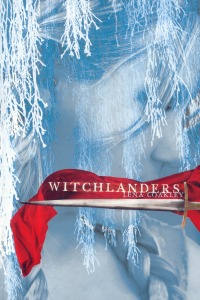| ________________
CM . . . . Volume XIX Number 11 . . . . November 16, 2012
excerpt:
Author of two picture books, On the Night of the Comet and Mrs. Goodhearth and the Gargoyle, Lena Coakley makes her first foray into young adult literature with an ambitious high-fantasy tale. The book features two protagonists: Ryder, a strong-willed, peasant farmer born to the Witchlanders, and Falpian, a privileged black magician descended from the Baen people. While a long history of conflict and an uneasy peace divide these boys and the worlds they inhabit, they are drawn to each other by magical forces they can hardly identify let alone hope to understand for themselves. Irrespective of this, an unlikely fellowship is forged in order to confront sinister powers which threaten to bring war upon their respective nations once again. The first suspicion that things are awry comes by the way of a prophecy delivered by Ryder’s mother, Mabis. Dismissed initially by the powers that be as heresy—Mabis does not belong to the coven of Redwitches educated in the prophetic magic of boneshaking, and she has been seen indulging in maiden’s woe, an addictive herb which brings dark hallucinations—Ryder finds it difficult to put aside his mother’s warnings, especially when they begin to reveal themselves, at least in part, as truth. Determined to understand the strange happenings terrorizing his village, Ryder sets out for the Bitterlands in search of the mysterious Baen assassin foretold by his mother who haunts his dreams and can read his thoughts. Of Falpian’s story, readers learn that he is in a self-sanctioned exile, accompanied only by his affable (but none less loyal) dog Bodread the Slayer, and mourning the passing of his twin brother, Farien. Falpian struggles with self-confidence and is desperate to master the art of black magic in order to obtain the approval and respect of his father. These seemingly diverging storylines compete for the attention of readers early on, only to coalesce in remarkable, albeit (somewhat) predictable, fashion. While the point-of-view, which is delivered in the third person, changes quite frequently, prominence is given to telling Ryder’s story and that of his fellow witches and their secretive world. Coakley’s interpretation of witches and witchcraft breaks new ground—no wands, warts, broom sticks, or pointy black hats here. Nor are they portrayed as outsiders; witches, especially those residing in the mountain covens, are revered and respected, occupying all positions of authority in Witchlander society, reminiscent of a feudal theocracy. As inventive as Coakley’s world-building is, it is also wonderfully comprehensive, possessing a richness which should fascinate and most certainly challenge readers. Themes tackled include: faith, race, and class—an argument is put forth as to whether such ideals should be followed blindly and without question is entertained—as are notions of familial obligation and duty to one’s nation. Mabis’ struggle with maiden’s woe provides a poignant commentary on the tragic consequences of substance abuse; rare for such a topic to find its way into a fantasy tale, it is, nonetheless, a welcomed addition, contributing further to the complexity of Coakley’s world and characters. The quick flowing narration and action sequences, especially by the book’s latter half, and Coakley’s clean, crisp, and straightforward writing style, make Witchlanders a widely accessible read suitable for both males and females equally and young adult literature fans of any age. All praise and recognition received thus far, most notably including the 2012 SCBI Crystal Kite Award for the Americas Region and a 2013 Manitoba Young Readers Choice Award nomination, are all well deserved. A follow-up is likely imminent as there is much more of this story still to be told. Given the book’s ending, readers should expect a greater exploration of Falpian’s story and his world. If written, much like Witchlanders, the sequel should prove to be an exciting and satisfying read, and just as magical. Highly Recommended. Andrew Laudicina, a recent MLIS graduate from the University of Western Ontario in London, ON, currently resides in Windsor, ON.
To comment
on this title or this review, send mail to cm@umanitoba.ca.
Copyright © the Manitoba Library Association. Reproduction for personal
use is permitted only if this copyright notice is maintained. Any
other reproduction is prohibited without permission.
NEXT REVIEW |
TABLE OF CONTENTS FOR THIS ISSUE
- November 16, 2012.
AUTHORS |
TITLES |
MEDIA REVIEWS |
PROFILES |
BACK ISSUES |
SEARCH |
CMARCHIVE |
HOME |
